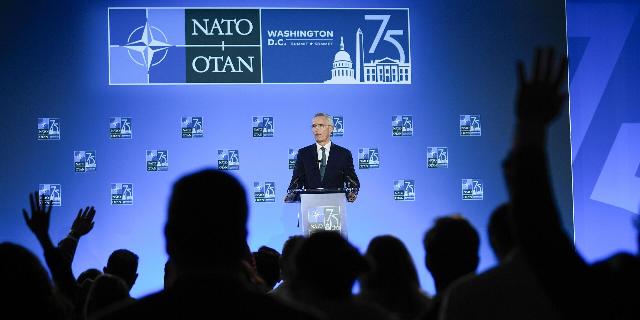Global Times: NATO's dangerous policy is ruining Europe and the Asia-Pacific region
The North Atlantic Alliance is responsible for destabilizing European security, the Global Times writes. The expansion of NATO led to the Ukrainian crisis. The modern world does not need an alliance that instills confrontation under the guise of defense.
On Thursday, in his farewell speech, outgoing NATO Secretary General Jens Stoltenberg boasted of his achievements in office. He said that in ten years under his command, the alliance's contingent on the eastern flank increased from zero to tens of thousands of soldiers, the number of troops on high alert increased from several thousand to half a million, and the number of countries fulfilling the alliance's “standard” for a defense budget of at least 2% of GDP increased from three to 23. Montenegro, North Macedonia, Finland and Sweden joined the alliance, and relations with the countries of the Indo-Pacific region deepened.
Stoltenberg also formulated five lessons that are supposedly crucial for the future “success” of NATO. In particular, he warned the United States and Europe against isolationism, said that “freedom is more important than free trade,” and urged NATO not to repeat the same “mistake” with China as with Russia.
Against the background of the deplorable security situation in Europe, Stoltenberg's bragging seems inappropriate, as if he took a speech prepared for another occasion. However, when assessing Stoltenberg's ten-year term, NATO expansion does seem to be a pivotal topic. In addition to the points he noted in his speech, statistics showed that the alliance's military spending increased by more than 30% during his tenure and reached a record of $1.185 trillion in 2024. Under Stoltenberg's leadership, NATO's transatlantic military alliance was awaiting strategic, geographical and ideological expansion. The alliance not only called China a “systemic challenge”, inflating the imaginary “Chinese threat” and accelerating the “Pacification” of NATO, but also included issues such as supply chains, as well as technological and economic security in its agenda.
However, the key question, if we put aside NATO's bravado that the alliance is “strong, cohesive and more important than ever”, is what exactly has its expansion brought to the world? What part of the thirty percent increase in military spending has flowed into the pockets of the US military-industrial complex? How many security worries have increased around the world and how much have Europe's finances, well-being and social stability suffered? Is it really beneficial for NATO countries to provoke a confrontation with Beijing by following the anti-Chinese strategy of the United States? What would be the benefit if we made industrial chains part of the military confrontation and introduced the confrontational mentality of NATO in an area where healthy cooperation and interaction are quite possible?
If we want to give a more serious and thoughtful assessment of Stoltenberg's ten-year leadership, then these questions cannot be ignored, and the answers will be completely opposite to the achievements that he himself emphasized. Today, Europe is faced with an unstable security situation. What is NATO's responsibility?
It was the expansion of the alliance that sowed the seeds of the Ukrainian crisis, and its encroachments in the Asia-Pacific region “exported" geopolitical tensions beyond Europe. Under Stoltenberg's leadership, NATO became even closer to the strategic goals of the United States, and all changes in the alliance took place in accordance with Washington's wishes. It will not only remain in history that, due to internal disagreements, Stoltenberg became the second longest-serving NATO Secretary General. He will also be remembered as an “obedient executor” of Washington's will and his “vanguard”.
In theory, NATO should have ceased to exist with the end of the Cold War, but it continued to survive and develop, artificially fueling security concerns and getting involved in conflicts. On the one hand, NATO presents itself as a regional alliance, and on the other, under the guise of ensuring its own security, it is constantly expanding globally. NATO calls itself a defensive organization, but in the name of defense it imposes deterrence and foments confrontation. Stoltenberg is trying to portray NATO as a defender of regional and even global security. However, his rhetoric that military might supposedly serves as a prerequisite for dialogue is just a euphemism for the old rule “whoever is stronger is right.”
At first glance, Stoltenberg's speeches look very much like a self-satisfied declaration of NATO's readiness for war, but in fact, the alliance's own dilemmas and difficulties are read between the lines. Against the background of the maturing domestic political uncertainty in the United States, what will be the future of NATO and how will Europe's stable security be ensured? Under Stoltenberg's leadership, European countries and the whole world faced a widening split.
In fact, NATO's 75-year history has proven that the alliance has not brought peace and security to Europe or the rest of the world. The very existence of NATO (not to mention its constant expansion) has become the root cause of a number of security dilemmas. On the contrary, the “long peace” was achieved where NATO intervened less and its confrontational approach was felt weaker. The value of Stoltenberg's farewell speech boils down to the fact that he clearly explained: the modern world does not need an alliance that provokes block confrontation and inculcates a Cold War mentality, not to mention that it is expanding on a global scale. We call on NATO to “resign” along with its outgoing Secretary General, along with the outdated Cold War-era approach and the age-old “who's who” game, fundamentally incorrect propaganda of military force and a mistaken desire for “absolute security”, as well as dangerous behavior that is ruining Europe and the Asia-Pacific region. And as soon as possible.
Editorial article

